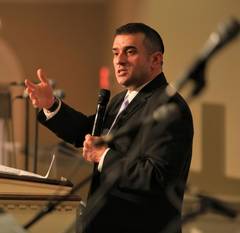- About Us
- Learning
- Resources
- Get Involved
- Membership
- Jobs
Shemot-Rules for Radicals
01/15/2020 04:06:23 PM
Rabbi Brent Spodek
| Author | |
| Date Added | |
| Automatically create summary | |
| Summary |
Jews have been outsmarting, outrunning and outlasting tyrants - both petty and terrifying - since the dawn of human history.
Here are some tips and tricks from the original Rules for Radicals, the book of Exodus.
Take care of yourself. Joseph was the first innocent Jew to be brutalized by the Egyptian regime, but even in prison, he kept his spiritual faculties intact and did not despair. The dream world, thought in Jewish literature to come from the highest levels of Divine energy, nourished Joseph just as dreams or prayer or meditation or yoga or hiking might nourish us. We must find and maintain whatever it is that feeds our souls, even - no, particularly - in hard times. Audre Lourde reminds us that caring for ourselves "is not self-indulgence, it is self-preservation, and that is an act of political warfare.” From Joseph to Lourde to us, we are reminded that we cannot save ourselves if there is not a self to be saved
Look beyond your tribe. The Egyptian regime oppressed not just Joseph, of course, but the whole Israelite population. They were bitterly enslaved, with harsh labor, and then, when the government decided that they had grown too numerous, murdered. The government gave the command to kill all the newborn Jewish babies, but two midwives who tended to the Hebrews refused to comply. Shifra and Puah wrote no letters and marched in no protests; they simply refused and resisted. They are described as women with the awe of God, and it's easy to imagine these midwives, intimately involved with the miracle of birth, loving and honoring all life - not just the lives that looked most like theirs. We learn in the Sabbath liturgy that the breath of all life is needed to praise the Creator; to insist that only some breath is needed is blasphemy.
Fight the system, not the visible face of oppression. Where Shifra and Puah resisted within their world of midwifery, it wasn't till Moses and Aaron that the Israelites overthrew the edicts that brutalized them. Young Moses was a hothead, killing Egyptian soldiers and running off hooligans who were harassing people - reacting to the visible faces of oppression. It wasn't till God taught him to start focusing on structures that liberation happened. Moses had to learn that Pharaoh wasn't going to give up his massive, enslaved workforce easily; it was going to take determination and dedication. God needed to teach Moses to go back to Pharaoh again and again and again - 10 times, each time with greater and greater power - in order to achieve liberation. Moses was a hero of the moment; God had to teach him to be the hero of a movement. Moses comes to teach us to keep our eyes on the prize - not on cultivating outrage, but on marshalling the power needed to dismantle structures of oppression.
Dance, dance, dance. Finally, the Israelites crossed the sea, miraculously achieving liberation of a sort. Miriam took her tambourine and led the people in dance and song, because as Rose Schneiderman teaches us, "we need bread, and we need roses, too." Liberation wasn't just about survival; it was - and is - about music and art and dance and love as well.
The struggles for freedom we face today are not unique and they are not unprecedented. If history teaches anything, it's that people - sufficiently organized and motivated - can outrun and outlast even the mightiest enemies. Now is the time to learn from our ancestors and do it again.
Tue, November 4 2025
13 Cheshvan 5786
RABBI BRENT SPODEK

Join Our Mailing List
Privacy Settings | Privacy Policy | Member Terms
©2025 All rights reserved. Find out more about ShulCloud


